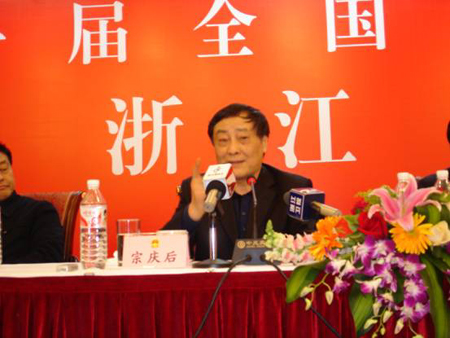By Yuan Fang
China.org.cn staff reporter
"The Chinese government should cancel value-added tax levied on businesses and oblige them to increase employees' wages instead," said Zong Qinghou, chairman of China's famous beverage firm Wahaha, in a side-session to the annual National People's Congress assembly.
|

|
|
Zong Qinghou, chairman of China's famous beverage firm Wahaha.?[China.org.cn] |
Over the past two years, Zong has enjoyed considerable media exposure for his bold confrontation with former French partner Danone over the control of the famous Wahaha brand.
Heavy taxation has eaten into the profits of many companies in recent years, especially small and medium-sized ones, restricting their ability to increase salaries for their employees, he said.
"If people don't earn more, they won't spend more," he added. "China has a huge population of 1.3 billion, but we still rely too much on overseas demand to support our economic growth. As a result, China's economy has suffered a heavy blow from the global economic recession and contracting overseas demand."
Zong suggests that while maintaining export growth, China should stimulate domestic demand by increasing people's incomes. "Those working in businesses should be given higher salaries."
However, the crux lies here: with heavy tax burdens, enterprises will be reluctant to part with a sliver of their already razor-thin profits to increase pay for employees.
One solution proposed by Zong would be that the government should reduce tax levies on businesses, or even cancel value-added tax altogether and instead compel them to increase salaries.
In China, a company or individual engaged in marketing goods and/or providing processing, repair and/or replacement services within China will be liable for value added tax at a rate of up to 17 percent.
"The problem with China's current taxation policy is that it first collects taxes and then distributes them in the form of subsidies to businesses or low-income groups in time of difficulties," said Zong. "Why not reduce the tax and give the money directly to low-income employees?"
With higher incomes, people will spend more, he argued, adding: "Of course, the government should also strive to build a better and more comprehensive social security network to provide the public with a level of confidence and ensure that money from higher incomes is not simply salted away in the bank for times of need."
"China can sustain rapid economic growth for the next two or three decades if it manages to spur its own population to spend actively," Zong said.
On the other hand, with a lower tax burden, companies will have more money to invest in technological innovation and product upgrades, which will enable them to expand business and in turn create more jobs, according to Zong.
"China is now largely a world manufacturing workshop of cheap and low technology products which generate only marginal profits. Therefore, companies need to attach more attention to technological innovation and climb up the manufacturing chain," Zong said. "When businesses grow, the whole economy will certainly expand and fiscal income will not fall in spite of lower tax rates."
Zong also proposed to levy a sales tax on everyday goods, without saying what the specific tax rates should be. "With higher incomes, people will tend to ignore any slight increase in their shopping bills. But it could mean a big boost to the country's fiscal income, as China has a large population."
China currently only levies sales tax on a limited list of items, including tobacco, cosmetics, and top-end products like yachts and other such luxury items.
(China.org.cn March 8, 2009)